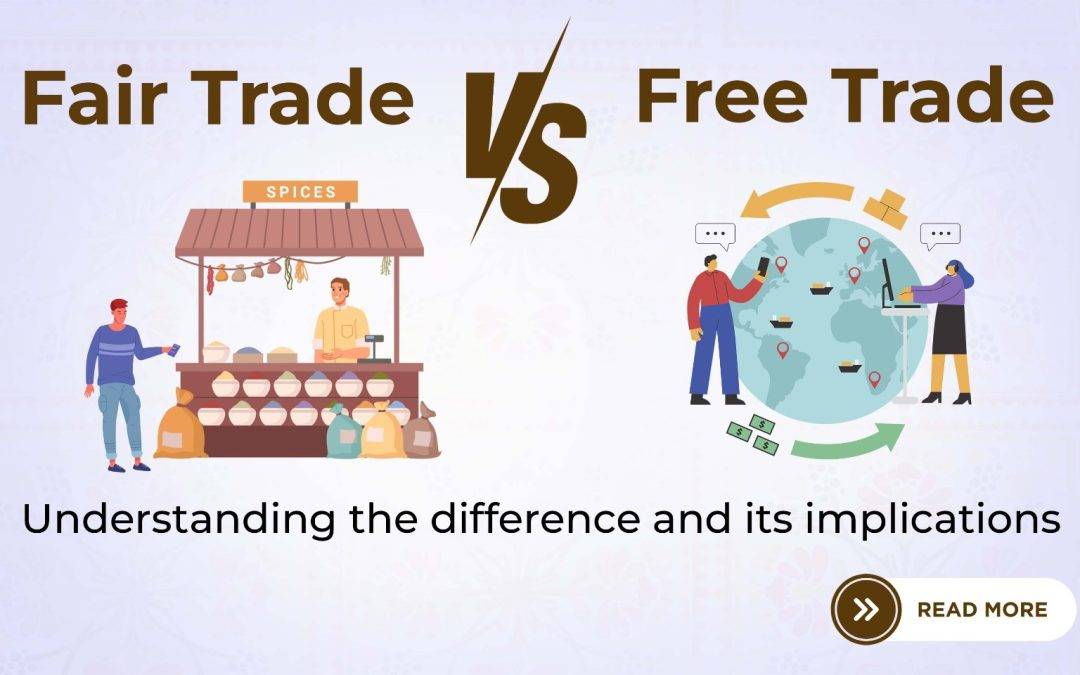Fairtrade and free trade are two ideas that are frequently discussed in international commerce. While both aim to promote economic prosperity and global cooperation, they do so through different mechanisms and with distinct implications for various stakeholders. In this blog, we examine the distinctions between free trade and fair trade, as well as the underlying ideas, practical applications, and current discussions surrounding these two trading systems.
Understand the concept Fair Trade
“Fair trade” promotes fair trade agreements between buyers and producers in rich and developing nations. Fundamentally, fair trade aims to rectify the power disparities present in traditional trade partnerships by guaranteeing producers a just price for their goods and giving them access to improved working conditions, environmentally friendly methods, and community development programs.
Key Principles of Fair Trade:
Fair Prices: A fair price that covers the cost of sustainable production and pays a livable wage is paid to producers for their goods.
Fair Labor Practices: Employees have the right to collective bargaining, safe working conditions, and fair pay.
Community Development: To strengthen underprivileged communities, Fair Trade supports community development programs including those in the fields of healthcare, education, and infrastructure.
Environmental Sustainability: To reduce the impact on ecosystems, Fair Trade promotes ecologically sustainable methods including organic farming and biodiversity conservation.
Know about Free Trade
On the other hand, free trade is an economic strategy that aims to maximize economic efficiency and foster global competitiveness by advocating for little government intervention in trade activities. Trade restrictions like tariffs, quotas, and subsidies are lessened or removed under a free trade agreement to allow for the unrestricted movement of products and services across international borders.
Key Principles of Free Trade
Market Efficiency: Free trade allocates resources efficiently by allowing products and services to be produced and consumed according to comparative advantage.
Benefits for Consumers: Free trade increases customer choice and purchasing power by providing a greater range of goods at competitive costs. This enhances consumer welfare.
Increased Productivity and Higher Living Standards: Through encouraging competition, innovation, and specialization, free trade boosts economic growth.
Global Integration: By making it easier for countries to interchange ideas, products, and services, free trade helps to build peace and stability on a worldwide scale.
Implications and Controversies
Free trade and fair trade have potential advantages but have detractors and supporters.
Fair Trade
Fair Trade certification procedures can be expensive and bureaucratic. It discourages small-scale businesses from participating in fair trade.
Concerns have been expressed over the capacity of Fair Trade programs to grow and compete in mainstream markets without sacrificing their fundamental values.
Free Trade
Critics argue that Free Trade agreements can exacerbate income inequality and lead to job displacement, particularly in industries that face competition from lower-wage countries.
There are concerns about the potential for Free Trade to undermine environmental protections and labor standards, as countries may engage in a “race to the bottom” to attract investment and remain competitive.
Critics also highlight the unequal distribution of benefits from Free Trade, with large corporations and wealthy individuals often reaping the lion’s share of gains at the expense of smaller businesses and workers.
Conclusion
Thus, the argument between free and fair trade is not a black-or-white one; rather, it is a detailed examination of trade laws and how they affect the growth of the world economy. While. Free trade emphasises market liberalisation and economic efficiency, and Fair Trade prioritises social and environmental justice. Earthen Connect, follows fair trade and aims to empower dedicated farmers who practice sustainable farming methods.

